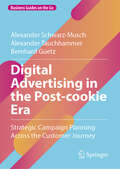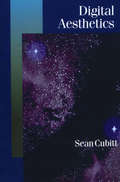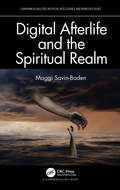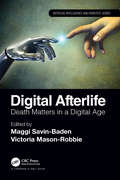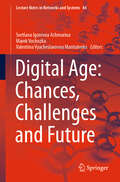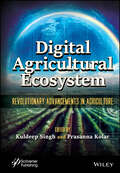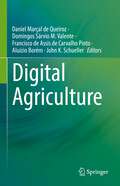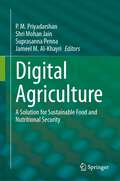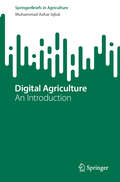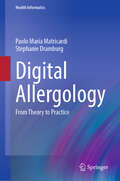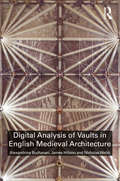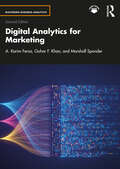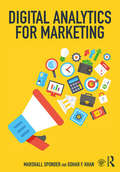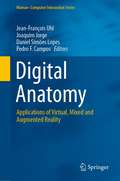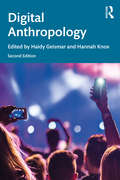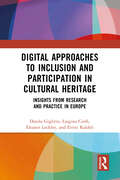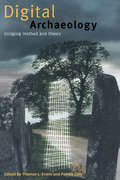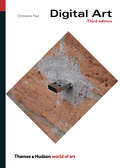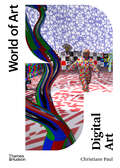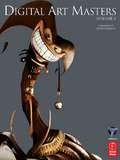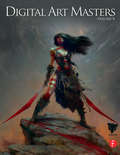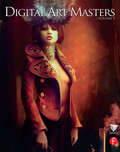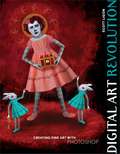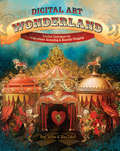- Table View
- List View
Digital Advertising in the Post-cookie Era: Strategic Campaign Planning Across the Customer Journey (Business Guides on the Go)
by Alexander Schwarz-Musch Alexander Tauchhammer Bernhard GuetzThis book explains how companies can successfully plan and implement their online campaigns – even after the end of third-party cookies. Campaigns on social media platforms, in search engines, and through display advertising can still be effective if potential customers are targeted accurately. The authors demonstrate how this can work without cookies: developing a "Minimum Viable Persona" and defining campaign groups along the customer journey play central roles. For each touchpoint on the path to purchase, milestones must be tracked, allowing the effectiveness and efficiency of the measures to be easily verified. A resource for marketing professionals seeking solutions in the post-cookie era to continue reaching their target audiences without waste coverage.
Digital Aesthetics (Published in association with Theory, Culture & Society)
by Sean CubittThis book investigates the aesthetic nature and purpose of computer culture in the contemporary world. It casts a cool eye on the claims of cybertopians, tracing the globalization of the new medium and enquiring into its effects on subjectivity and sociality. Drawing on historical scholarship, philosophical aesthetics, and the literature of cyberculture, the author argues for a genuine democracy beyond the limitations of the free market and the global corporation. Digital arts are identified as having a vital part to play in this process. Written in a balanced and penetrating style, the book both conveniently summarizes a huge literature and sets a new agenda for research and theory. Copyright © Libri GmbH. All rights reserved.
Digital Afterlife and the Spiritual Realm (Chapman & Hall/CRC Artificial Intelligence and Robotics Series)
by Maggi Savin-BadenFew religious leaders have examined the potential for the positive impact of digital media and digital immortality creation in religious contexts. It is evident that there have been recent moves away from traditional funeral services focusing on the transition of the deceased into the future world beyond, towards a rise of memorial content within funerals and commemorative events. This has heralded shifts in afterlife beliefs by replacing them, to all intents and purposes, by attitudes to this life. Digital Afterlife and the Spiritual Realm explores the ways in which digital media and digital afterlife creation affects social and religious understandings of death and the afterlife. Features Understands the impact of digital media on those living and those working with the bereaved Explores the impact of digital memorialisation post death Examines the ways in which digital media may be changing conceptions and theologies of death For many people, digital afterlife and the spiritual realm largely remains an area that is both inchoate and confusing. This book will begin to unravel some of this bafflement.
Digital Afterlife: Death Matters in a Digital Age (Chapman & Hall/CRC Artificial Intelligence and Robotics Series)
by Maggi Savin-Baden Victoria Mason-RobbieDespite the range of studies into grief and mourning in relation to the digital, research to date largely focuses on the cultural practices and meanings that are played out in and through digital environments. Digital Afterlife brings together experts from diverse fields who share an interest in Digital Afterlife and the wide-ranging issues that relate to this. The book covers a variety of matters that have been neglected in other research texts, for example: The legal, ethical, and philosophical conundrums of Digital Afterlife The ways digital media are currently being used to expand the possibilities of commemorating the dead and managing the grief of those left behind Our lives are shaped by and shape the creation of our Digital Afterlife as the digital has become a taken for granted aspect of human experience. This book will be of interest to undergraduates from computing, theology, business studies, philosophy, psychology, sociology, and education from all types of institutions. Secondary audiences include researchers and postgraduate researchers with an interest in the digital. At a practical level, the cost of data storage and changing data storage systems mitigate the likelihood of our digital presence existing in perpetuity. Whether we create accidental or intentional digital memories, this has psychological consequences for ourselves and for society. Essentially, the foreverness of forever is in question. Maggi Savin-Baden is Professor of Higher Education Research at the University of Worcester. She has a strong publication record of over 50 research publications and 17 books. Victoria Mason-Robbie is a Chartered Psychologist and an experienced lecturer having worked in the Higher Education sector for over 15 years. Her current research focuses on evaluating web-based avatars, pedagogical agents, and virtual humans.
Digital Age: Chances, Challenges and Future (Lecture Notes in Networks and Systems #84)
by Marek Vochozka Svetlana Igorevna Ashmarina Valentina Vyacheslavovna MantulenkoThis proceedings book presents the outcomes of the VII International Scientific Conference “Digital Transformation of the Economy: Challenges, Trends, New Opportunities”, which took place in Samara, Russian Federation, on April 26–27, 2019. Organized by the Samara State University of Economics, the conference chiefly focused on digital economy issues, such as theoretical preconditions for the development of economic systems in the digital age and specific practical issues related to real-world business practice. Consisting of six chapters corresponding to the thematic areas of the conference, and written by scientists and practitioners from different regions of Russia, Kazakhstan, the Czech Republic and Germany, the book offers answers to the most pressing questions for today’s business community: - How is our world changing under the influence of digital technology? - Is sustainable economic development a myth or reality in the context of digitalization? - What threats and opportunities does digitalization bring? - What are realities and prospects of digitalization in the context of business practice? - How do we create a digital infrastructure for the economy? - How should the legal environment of the economy be transformed in the context of digitalization? The conclusions and recommendations presented are not recipes for solving the existing economic problems, but instead are intended for use in further research on transformation processes in the economy and in the development of state economic policies in various countries and regions.
Digital Agricultural Ecosystem: Revolutionary Advancements in Agriculture
by Kuldeep Singh Prasanna KolarDigital Agricultural Ecosystem The book comprehensively explores the dynamic synergy between modern technology and agriculture, showcasing how advancements such as artificial intelligence, data analytics, and smart farming practices are reshaping the landscape to ensure food security in the era of climate change, as well as bridging the gap between cutting-edge research and practical implementation. Agriculture has historically been the foundation of human civilization and benefits communities all around the world. Agriculture has a creative, adaptable, and innovative history, and as the digital age draws closer, agriculture is once again poised for change. Each of the 20 chapters explores the connection between agricultural and technological advancements, and are divided into four key areas. Part 1 covers knowledge sharing in the digital agricultural ecosystem. In the context of modern agriculture, the chapters underscore the importance of information flow. Through comprehensive reviews of literature and assessments of farmer participation on social media platforms, these chapters illustrate the value of information sharing for sustainable agriculture. Part 2 explores the adoption and impact of digital technologies in agriculture. The use of cutting-edge digital technologies in agriculture is examined thoroughly in this section. The chapters included here outline how precision, artificial intelligence, and blockchain technology have the potential to transform methods of agriculture and improve food systems. Part 3 addresses smart farming and sustainable agriculture. This section focuses on sustainability and offers details on eco-friendly production methods, the significance of smart farming in many nations, including India and the UK, and cost-effective fertilizer sprayer technologies. Part 4 examines the modeling and analysis of agricultural systems. This last section explores how mathematical modeling and data analytics are used in agricultural systems, with insights on everything from the study of credit access constraints in rural regions to water resource management in irrigation systems. Audience The diverse readership includes farmers, agronomists, agricultural researchers, policymakers, environmentalists, information technologists, and students from academic and professional fields who are eager to learn more about how digital innovation and sustainable agriculture can be used to address global issues such as climate change, food security, and smart farming.
Digital Agriculture
by Aluízio Borém Daniel Marçal de Queiroz Domingos Sárvio M. Valente Francisco de Assis de Carvalho Pinto John K. SchuellerThis textbook addresses the most recent advances and main digital technologies used in farming. The reader will be able to understand the main concepts and techniques currently used to efficiently manage agricultural production systems. The book covers topics in a general and intuitive way, with examples and good illustrations.
Digital Agriculture: A Solution for Sustainable Food and Nutritional Security
by P. M. Priyadarshan Shri Mohan Jain Jameel M. Al-Khayri Suprasanna PennaThe world population is increasing while arable land is decreasing at an alarming rate. About one-quarter of arable land is degraded and needs significant restoration before it can sustain crops again. By 2030, the water supply will fall 40% short of meeting global demand. Moreover, looming climate change poses additional challenge to increasing food production to feed 10 billion people by 2050. Current major agricultural systems are on a largely unsustainable trajectory because of their contributions to greenhouse gas emissions, water pollution, and biodiversity loss.For these reasons, innovative technologies are being introduced in modern agriculture to sustain food production. They include digital and geospatial technologies to manage soil, climate and plant genetic resources. With the development of tools and sensors integrated into the internet of things (IoT) environment, physically collected information is converted into computer-readable language. Digital innovations thus allow real-time analysis, machine learning, and artificial intelligence (AI) that manage massive amount of data, also known as big data. Accordingly, digital agriculture affords greater potential for sustainable farming and economic benefits. This book summarizes the latest advances in AI-integration of agriculture practices. Specific focus includes but not limited to, big data, yield mapping, pests management, and optimal fertigation. As such, it presents a forward-looking approach to meet multiple UN Sustainable Development Goals, specifically, SDG 2, 6, 13 and 15.
Digital Agriculture: An Introduction (SpringerBriefs in Agriculture)
by Muhammad Azhar IqbalThe success of modern-day agriculture lies in the digitalization of agricultural systems. The primary aim of this book is to provide a starting point to understand the fundamentals and design of digital agriculture systems with reference to the enabling technologies that deal with the production, improvement, and protection of crops/plants and livestock. The other associated objectives of this book include the explanation of the design and deployment of IoT-based digital agriculture systems in such a simple way that agriculture students understand straightforwardly. Therefore, this book is an effort to partially fill the gap associated with the understanding of the development and deployment of digital agriculture systems (including both precision and smart farming). We believe that with the provided details of enabling technologies and their usage in digital agriculture systems, agriculture students will find it easier to comprehend the designing of small-/large-scale IoT-based digital agriculture systems. This book provides insight into different technologies, architectures, and case studies that will ultimately help students to understand the concept of Digital Agriculture and its related applications. It enables students to realize the importance of open issues and future challenges of digital agriculture systems.
Digital Allergology: From Theory to Practice (Health Informatics)
by Paolo Maria Matricardi Stephanie DramburgSeveral hundred million citizens suffer from allergic diseases, ranging from watery eyes to life-threatening anaphylactic shock. In addition to the individual reduction of quality of life, allergies have an impact on workplace efficiency and healthcare budgets. Although new developments of diagnostic assays are advancing quickly, their implementation in clinical routine is challenged by several barriers. This is very evident in the EU, where the gap between technological progress and modern diagnosis is rapidly growing. Digital Health tackles this challenge by providing novel tools, supporting allergy diagnosis and treatment through internet platforms, medical devices, smart-phone apps, telemedicine tools, etc. The integration of Digital Health procedures and tools in the management of allergic diseases will allow personalized diagnostic and therapeutic approaches with 24/7 interactivity between patients and professional healthcare. It will enable the delivery of faster, relevant healthcare support via real-time accessibility of key information for specialists, at primary health care centers, pharmacies and the patient´s home. "Digital Allergology: From Theory to Practice" is unique in comprehensively approaching "Digital Allergology", starting with the general frame to more specific parts on specific allergic diseases, public health as well as research and perspectives from several countries. Allergology being transversal, and covering dozen sub-specialty areas, the list of authors, each one with specific expertise in Digital Health applied to his/her sub-area of interest, is heterogeneous: same sub-areas will be seen from different perspectives. Built for allergists and other clinicians with a strong interest in allergic diseases, it will be a stimulating read for allied health professionals, insurance companies, public health administrators, manufacturers in allergen immunotherapy, IT developers, and clinical scientists.
Digital Analysis of Vaults in English Medieval Architecture
by Nicholas Webb Alexandrina Buchanan James HillsonMedieval churches are one of the most remarkable creative and technical achievements in architectural history. The complex vaults spanning their vast interiors have fascinated both visitors and worshippers alike for over 900 years, prompting many to ask: ‘How did they do that?’ Yet very few original texts or drawings survive to explain the processes behind their design or construction. This book presents a ground-breaking new approach for analysing medieval vaulting using advanced digital technologies. Focusing on the intricately patterned rib vaulting of thirteenth and fourteenth century England, the authors re-examine a series of key sites within the history of Romanesque and Gothic Architecture, using extensive digital surveys to examine the geometries of the vaults and provide new insights into the design and construction practices of medieval masons. From the simple surfaces of eleventh-century groin vaults to the gravity-defying pendant vaults of the sixteenth century, they explore a wide range of questions including: How were medieval vaults conceived and constructed? How were ideas transferred between sites? What factors led to innovations? How can digital methods be used to enhance our understanding of medieval architectural design? Featuring over 200 high quality illustrations that bring the material and the methods used to life, Digital Analysis of Vaults in English Medieval Architecture is ideal reading for students, researchers and anyone with an interest in medieval architecture, construction history, architectural history and design, medieval geometry or digital heritage.
Digital Analytics for Marketing (Mastering Business Analytics)
by Gohar F. Khan Marshall Sponder A. Karim FerozThis second edition of Digital Analytics for Marketing provides students with a comprehensive overview of the tools needed to measure digital activity and implement best practices when using data to inform marketing strategy. It is the first text of its kind to introduce students to analytics platforms from a practical marketing perspective. Demonstrating how to integrate large amounts of data from web, digital, social, and search platforms, this helpful guide offers actionable insights into data analysis, explaining how to "connect the dots" and "humanize" information to make effective marketing decisions. The authors cover timely topics, such as social media, web analytics, marketing analytics challenges, and dashboards, helping students to make sense of business measurement challenges, extract insights, and take effective actions. The book’s experiential approach, combined with chapter objectives, summaries, and review questions, will engage readers, deepening their learning by helping them to think outside the box. Filled with engaging, interactive exercises and interesting insights from industry experts, this book will appeal to undergraduate and postgraduate students of digital marketing, online marketing, and analytics. Online support materials for this book include an instructor’s manual, test bank, and PowerPoint slides.
Digital Analytics for Marketing (Mastering Business Analytics)
by Gohar F. Khan Marshall SponderThis comprehensive book provides students with a "grand tour" of the tools needed to measure digital activity and implement best practices for using data to inform marketing strategy. It is the first text of its kind to introduce students to analytics platforms from a practical marketing perspective. Demonstrating how to integrate large amounts of data from web, digital, social, and search platforms, this helpful guide offers actionable insights into data analysis, explaining how to "connect the dots" and "humanize" information to make effective marketing decisions. The author covers timely topics, such as social media, web analytics, marketing analytics challenges, and dashboards, helping students to make sense of business measurement challenges, extract insights, and take effective actions. The book’s experiential approach, combined with chapter objectives, summaries, and review questions, will engage readers, deepening learning by helping them to think outside the box. Filled with engaging, interactive exercises, and interesting insights from an industry expert, this book will appeal to students of digital marketing, online marketing, and analytics. A companion website features an instructor’s manual, test bank, and PowerPoint slides.
Digital Anatomy: Applications of Virtual, Mixed and Augmented Reality (Human–Computer Interaction Series)
by Joaquim Jorge Jean-François Uhl Daniel Simões Lopes Pedro F. CamposThis book offers readers fresh insights on applying Extended Reality to Digital Anatomy, a novel emerging discipline. Indeed, the way professors teach anatomy in classrooms is changing rapidly as novel technology-based approaches become ever more accessible. Recent studies show that Virtual (VR), Augmented (AR), and Mixed-Reality (MR) can improve both retention and learning outcomes. Readers will find relevant tutorials about three-dimensional reconstruction techniques to perform virtual dissections. Several chapters serve as practical manuals for students and trainers in anatomy to refresh or develop their Digital Anatomy skills. We developed this book as a support tool for collaborative efforts around Digital Anatomy, especially in distance learning, international and interdisciplinary contexts. We aim to leverage source material in this book to support new Digital Anatomy courses and syllabi in interdepartmental, interdisciplinary collaborations. Digital Anatomy – Applications of Virtual, Mixed and Augmented Reality provides a valuable tool to foster cross-disciplinary dialogues between anatomists, surgeons, radiologists, clinicians, computer scientists, course designers, and industry practitioners. It is the result of a multidisciplinary exercise and will undoubtedly catalyze new specialties and collaborative Master and Doctoral level courses world-wide. In this perspective, the UNESCO Chair in digital anatomy was created at the Paris Descartes University in 2015 (www.anatomieunesco.org). It aims to federate the education of anatomy around university partners from all over the world, wishing to use these new 3D modeling techniques of the human body.
Digital Anthropology
by Haidy Geismar; Hannah KnoxDigital Anthropology, 2nd Edition explores how human and digital can be explored in relation to one another within issues as diverse as social media use, virtual worlds, hacking, quantified self, blockchain, digital environmentalism and digital representation. The book challenges the prevailing moral universal of “the digital age” by exploring emergent anxieties about the global spread of new technological forms, the cultural qualities of digital experience, critically examining the intersection of the digital to new concepts and practices across a wide range of fields from design to politics. In this fully revised edition, Digital Anthropology reveals how the intense scrutiny of ethnography can overturn assumptions about the impact of digital culture and reveal its profound consequences for everyday life around the world. Combining case studies with theoretical discussion in an engaging style that conveys a passion for new frontiers of enquiry within anthropological study, this will be essential reading for students and scholars interested in theory of anthropology, media and information studies, communication studies and sociology. With a brand-new Introduction from editors Haidy Geismar and Hannah Knox, as well as an abridged version of the original Introduction by Heather Horst and Daniel Miller, in conjunction with new chapters on hacking and digitizing environments, amongst others, and fully revised chapters throughout, this will bring the field-defining overview of digital anthropology fully up to date.
Digital Approaches to Inclusion and Participation in Cultural Heritage: Insights from Research and Practice in Europe
by Luigina Ciolfi Danilo Giglitto Eleanor Lockley Eirini KaldeliDigital Approaches to Inclusion and Participation in Cultural Heritage brings together best examples and practices of digital and interactive approaches and platforms from a number of projects based in European countries to foster social inclusion and participation in heritage and culture. It engages with ongoing debates on the role of culture and heritage in contemporary society relating to inclusion and exclusion, openness, access, and bottom-up participation. The contributions address key themes such as the engagement of marginalised communities, the opening of debates and new interpretations around socially and historically contested heritages, and the way in which digital technologies may foster more inclusive cultural heritage practices. They will also showcase examples of work that can inspire reflection, further research, and also practice for readers such as practice-focused researchers in both HCI and design. Indeed, as well as consolidating the achievements of researchers, the contributions also represent concrete approaches to digital heritage innovation for social inclusion purposes. The book’s primary audience is academics, researchers, and students in the fields of cultural heritage, digital heritage, human-computer interaction, digital humanities, and digital media, as well as practitioners in the cultural sector.
Digital Archaeology: Bridging Method and Theory
by Patrick Daly Thomas L. EvansThe use of computers in archaeology is entering a new phase of unparalleled development, moving on from a specialist methodology on the margins to a powerful practical and analytical tool used across all areas of archaeological interest. With a thorough examination of the ways in which both everyday and cutting-edge technologies can be used to inform and enhance traditional methods, this book brings together ideology from the academic world and pragmatic, concrete examples to show how fieldwork, theory and technology fit together today as never before. Covering a history of the rise of computer use in archaeology as well as a thorough assessment of a number of high profile examples such as the Ferrybridge Chariot, this book shows how new technologies have been implemented into both theory and method as an integral part of the archaeological process. With contributions from renowned experts, experienced professionals and emerging names in the field, this unique, forward-thinking book brings together previously disparate aspects of archaeology in a new holistic approach to the study of the past. A companion website is also available to allow further study of the images included.
Digital Art (Third edition) (World of Art)
by Christiane Paul"Paul does an impressive job of compressing the activity of a huge field, in which there are no obvious heroes and no single aesthetic line." --Publishers Weekly Digital technology has revolutionized the way we produce and experience art today. Not only have traditional forms of art such as printing, painting, photography, and sculpture been transformed by digital techniques and media, but the emergence of entirely new forms such as internet and software art, digital installation, and virtual reality has forever changed the way we define art. Christiane Paul surveys the developments in digital art from its appearance in the 1980s to the present day and looks ahead to what the future may hold. She discusses the key artists and works in the genre, drawing a distinction between work that uses digital practices as tools to produce traditional forms and work that uses them to create new kinds of art. She explores the broader themes and questions raised by these artworks such as viewer interaction, artificial life and intelligence, political and social activism, networks and telepresence, and issues surrounding the collection, presentation, and preservation of digital art. This third, expanded edition of the popular resource investigates key areas of digital art practice that have gained prominence in recent years, including interactive public installation, augmented and mixed reality, social networking, and file-sharing technologies.
Digital Art (World of Art #0)
by Christiane PaulThe fourth edition of the essential introduction to digital art, one of contemporary art’s most exciting and dynamic forms of practice. Digital art, along with the technological developments of its medium, has rapidly evolved from the “digital revolution” into the social media era and then to the postdigital and post-Internet landscape. This new, expanded edition of Christiane Paul’s acclaimed book traces the emergence of artificial intelligence, augmented and mixed realities, and non-fungible tokens (NFTs) and surveys themes explored by digital artworks in the areas of activism, networks and telepresence, and ecological art andthe Anthropocene. It also examines issues surrounding the collection, presentation, and preservation of digital art. It looks at the impact of digital techniques and media on traditional forms of art, such as printing, painting, photography, and sculpture, as well as exploring the ways in which the Internet and software art, digital installation, and virtual reality have emerged as recognized artistic practices. Digital Art is an accessible and engaging text that brings to life individual works, explaining in clear terms how they use technologyto produce artworks with a radical new aesthetic and thematic and interactive qualities. It is an essential critical guide to all forms of digital art.
Digital Art Masters: Volume 2
by 3dtotal.ComMeet some of the finest digital 2D and 3D artists working in the industry today, from Patrick Beaulieu, Philip Straub, Benita Winckler, Alessandro Baldasseroni to Khalid Al Muharraqi, Marcel Baumann and Marek Denko and see how they work. More than just a gallery book - in Digital Arts Masters each artist has written a breakdown overview, with supporting imagery of how they made there piece of work.With Digital Arts Masters you'll understand the artists' thought process and discover the tips, tricks and techniques which really work.
Digital Art Masters: Volume 4 (Digital Art Masters Series)
by 3dtotal.ComMeet some of the finest 2D and 3D artists working in the industry today and discover how they create some of the most innovative digital art in the world. More than a gallery book or a coffee table book- Digital Art Masters Volume 4 includes over 50 artists and 900 unique and stunning 2D and 3D digital art. Beyond the breaktaking images is a breakdown of the techniques, challenges and tricks the artists employed while creating stunning imagery. This volume, much like the previous volumes is not your standard coffee table book nor is it our usual how-to-book. This book offers inspiration and insight for the advanced amateur and professional CG artists. The Digital Art Masters series has expanded upon the competition's gallery book concept and has added the insight and experiences of professional CG artists worldwide. Divided into 5 sections, Sci-Fi, Scene, Fantasy, Character and Cartoon, Each featured artist segement will include the thought processes behind creating unique digital images and an artist portfolio for further inspiration. Find your inspiration and discover the tips, tricks and techniques that really work.
Digital Art Masters: Volume 5
by 3dtotal.ComMeet some of the finest 2D and 3D artists working in the industry today and discover how they create some of the most innovative digital art in the world. More than a gallery book or a coffee table book- Digital Art Masters Volume 5 includes over 50 artists and 900 unique and stunning 2D and 3D digital art. Beyond the breath taking images is a breakdown of the techniques, challenges and tricks the artists employed while creating stunning imagery. This volume, much like the previous volumes is not your standard coffee table book nor is it our usual how-to-book. New to this volume will be 5 artist video tutorials. Five artists will specifically detail an aspect of their gallery image from start to finish, offering further technique driven insight and expertise offering 2 ½ hours of additional inspiration. With a click of a mouse, artists willbe able to apply the leading techniques to their own work with access to additional video tutorials, source files, textures and digital brushes at the companion website: http://www.focalpress.com/digital-art-masters/index.html.
Digital Art Revolution
by Scott LigonThere's no question that applications like Photoshop have changed the art world forever. Master digital artists already use these tools to create masterpieces that stretch the limits of the imagination--but you don't have to be a master to create your own digital art. Whether you're a beginner who's never picked up a pen or paintbrush, or a traditional artist who wants to explore everything a digital canvas might inspire, digital artist and arts educator Scott Ligon guides you and inspires you with clear instructions and exercises that explore all the visual and technical possibilities.Featuring the work of 40 of the finest digital artists working today, Digital Art Revolution is your primary resource for creating amazing artwork using your computer.From the Trade Paperback edition.
Digital Art Wonderland: Creative Techniques for Inspirational Journaling and Beautiful Blogging
by Angi Sullins Silas ToballSet out on a digital adventure! Come inside Digital Art Wonderland where digital art and art journaling embark together on a luscious visual journey. The daring crew of Angi Sullins and Silas Toball give you a personal tour through a digital art journaling world, showing you how to make your own wonderous creations through instruction, design concepts and lots of inspiration. In Digital Art Wonderland, you'll find: 8 tutorials with techniques, tricks and trips for the intermediate Adobe Photoshop user to enhance physical art as well as create digital art from scratch. Instructions and ideas to incorporate a variety of typography into your artwork. A guide to using your art in the blogging world, including information about blog set-up, adding personal design touches, blog etiquette and more. Exercises for breaking free of art-making fears and letting your artistic instincts take over. Let Digital Art Wonderland show you a whole new world of art making.
Digital Art and Meaning: Reading Kinetic Poetry, Text Machines, Mapping Art, and Interactive Installations (Electronic Mediations)
by Roberto SimanowskiIn a world increasingly dominated by the digital, the critical response to digital art generally ranges from hype to counterhype. Popular writing about specific artworks seldom goes beyond promoting a given piece and explaining how it operates, while scholars and critics remain unsure about how to interpret and evaluate them. This is where Roberto Simanowski intervenes, demonstrating how such critical work can be done. Digital Art and Meaning offers close readings of varied examples from genres of digital art such as kinetic concrete poetry, computer-generated text, interactive installation, mapping art, and information sculpture. For instance, Simanowski deciphers the complex meaning of words that not only form an image on a screen but also react to the viewer&’s behavior; images that are progressively destroyed by the human gaze; text machines generating nonsense sentences out of a Kafka story; and a light show above Mexico City&’s historic square, created by Internet users all over the world. Simanowski combines these illuminating explanations with a theoretical discussion that employs art philosophy and history to achieve a deeper understanding of each particular example of digital art and, ultimately, of the genre as a whole.
